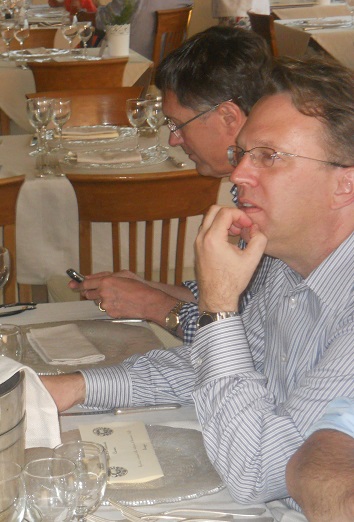Today, we present a guest post written by Jeffrey Frankel, Harpel Professor at Harvard’s Kennedy School of Government, and formerly a member of the White House Council of Economic Advisers.
It will be tough to fill the shoes of Stan Fischer as Fed vice-chair. The candidates most actively under consideration by the Administration, to serve as number 2 to Jay Powell as Chair, are Rich Clarida, Larry Lindsey, and John Williams. Clarida and Williams are both excellent economists; either one would be great for this job.
Williams, who has been getting the most media play, has been at the San Francisco Fed since 2002. (I think he was an undergraduate student in a large macro class I taught at UC Berkeley long ago.) He argues that the natural rate of interest (“r*”) has undergone a long-lasting global decline. At a Brookings conference earlier this month, he made his case that monetary policy should pursue a price level target.
Clarida has been at Columbia University since 1988, with a stint as a Treasury official under George W. Bush and then a side-job at PIMCO. The research for which he is most famous is on monetary policy in DSGE models. But at the Fed, if the dictates of those models conflicted with good policy sense, I am confident that he would opt for the latter. (It has been great working with him for years on the board of the NBER’s International Seminar of Macroeconomics. The photo of Clarida and Williams comes from a 2013 meeting in Rome.)
Larry Lindsey is a nice guy (I worked with him at the Reagan CEA), but too political for my taste. Still I will give him credit: when he was made to resign from his 2001-02 position as George W. Bush’s Director of the National Economic Council, the main reason was reportedly Lindsey’s estimate that an invasion of Iraq could cost $100-$200 billion, an estimate that the administration considered too high by a factor of 2-3. (Of course, in the event it turned out to be too low. By a factor of 25.)
This post written by Jeffrey Frankel.

John Williams would be a great choice. Lindsey – not so much.
Who are the female candidates not up for consideration?? I bet I could come up with a short list in a relatively short period of time. I’m not a believer in quotas or marking the gender checklist box, but you might think ONE woman might be a candidate.
How about a Neo-Fisher on the board?
@Erik Poole
It’s funny you mentioned that. I haven’t done much digging on a female candidate for the job (we’re playing hypotheticals here obviously since the VSG isn’t going to choose any females). It hit me pretty fast after you said that, that Karnit Flug, who heads Israel’s central bank would be a near PERFECT choice. I think she would take the job on the pure status of the job alone (being #2 on the American Central Bank most people would view as a step up, and Israel gets another voice in US policy, and then just replaces her with another good one lickety-split.
All of this, again, is academic/moot because no way in hell the VSG chooses a female. Still kind of an interesting game of “what if….?”
I know that economists harangue tediously about an “independent” Federal Reserve. But what they mean is independence from congressional influence. But what it means in practice is no independence at all but a Federal Reserve that is subservient to Wall Street and bankers.
A truly independent Federal Reserve would be composed of one-third bankers, one-third labor representatives and one-third consumer representatives. In the absence of that, a pox on the Federal Reserve. Better they all die in a fire for all the harm they do.
Unlike the Vietnam War, foreigners paid for the Iraq War, because of the new world order. The Saudis and OPEC required countries to buy their oil in dollars. So, countries had to exchange their goods for dollars to buy oil. Consequently, the U.S. was able to maintain the most powerful military in the world, by far, which added to U.S. GDP, boosted R&D spending, and provided valuable spin-offs for the private sector. The exchange was the U.S. would use its powerful military to police and maintain peace and stability in the world in exchange for consuming more than producing in the global economy and in the long run. Remarkably, the U.S. has been able to maintain a strong international investment position:
https://voxeu.org/article/external-debt-us-no-cause-concern-yet
joseph: How about the US Fed dropping the employment mandate and just focusing on price stability?
Let your presidential system take care of the politics and make fiscal decisions.
What you propose would be disastrous. It would completely politicize the US Fed and lead to even more short-term, special-interest driven decisions than is currently the case.
In the meantime, are we all glad that Trump got rid of the little old white hair lady with the PhD in economics?
When some of us wonder if Trump has a mild case of FASD or that he sniffed glue during the formative years, it makes sense that he replaces a brainy old lady who he finds sexually unappealing.
“What you propose would be disastrous. It would completely politicize the US Fed and lead to even more short-term, special-interest driven decisions than is currently the case.”
You don’t think the appointment of the current Fed members is political? The members are appointed by the president and approved by the senate. How is that not political? The appointment of labor reps and consumers reps would be no more political.
As far as special interests, why is it that the interests of workers and consumers is “special” while the interests of bankers is sacrosanct? We already have a special interest Fed — the interests of bankers.